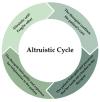"I Am Longing and Afraid to Depend on You": A Case Report on Breakdowns of Therapeutic Alliance and Interpersonal Cycles in Complex Trauma
- PMID: 39766406
- PMCID: PMC11675059
- DOI: 10.3390/brainsci14121207
"I Am Longing and Afraid to Depend on You": A Case Report on Breakdowns of Therapeutic Alliance and Interpersonal Cycles in Complex Trauma
Abstract
Background: Patients with Complex Trauma (CT) may have an impaired ability to trust others and build intimate relationships due to non-integrated representations of self and others. This sometimes leads to an oscillation between needing and fearing intimacy in their adult relationships. This dynamic can occur in the therapeutic relationship, undermining the effectiveness of therapy and affecting the mental health of both the patient and the therapist. To date, no study has analyzed interpersonal patient-therapist dynamics in cases of CT. The present case aims to fill this gap by exploring relational cycles between the therapist and the patient during the therapeutic process in terms of goals and self-other beliefs.
Methods: The methodology consisted of a shared and integrated reconstruction by the patient and therapist, both with clinical expertise in psychology, of the impasse in their therapeutic relationship. The reading was done through the lens of the cognitive model of Pathological Affective Dependence, a theory of traumatic relationships, by describing the primary interpersonal cycles occurring in the therapeutic relationship (altruistic, deontological, and vulnerable).
Results: The condition of CT leads to several alliance breakdowns and specific interpersonal cycles, leading to new healing meanings for the patient and the relationship itself.
Limitations: The study's main limitation is that it consists of a qualitative analysis of the therapeutic relationship without data that can quantify the clinically observed changes.
Conclusions: This case report demonstrates how CT, PAD and the fear of intimacy can be risk factors for the therapeutic alliance and how the therapeutic relationship constitutes a fundamental tool for intervention effectiveness in patients who experience unmet primary needs.
Keywords: case report; complex trauma; fear of intimacy; impasse; interpersonal cycles; pathological affective dependence; therapeutic alliance; therapeutic relationship.
Conflict of interest statement
The authors declare no conflicts of interest.
Figures




Similar articles
-
Relational Patterns and the Development of the Alliance: A Systematic Comparison of two Cases.Clin Psychol Psychother. 2017 Mar;24(2):555-568. doi: 10.1002/cpp.2019. Epub 2016 May 17. Clin Psychol Psychother. 2017. PMID: 27189795
-
Covert therapeutic micro-processes in non-recovered eating disorders with childhood trauma: an interpersonal process recall study.J Eat Disord. 2022 Mar 21;10(1):42. doi: 10.1186/s40337-022-00566-1. J Eat Disord. 2022. PMID: 35314004 Free PMC article.
-
More than Meets the "I": A Panoramic View of Epistemic Trust in Psychotherapy.Psychopathology. 2025;58(2):80-93. doi: 10.1159/000541667. Epub 2024 Oct 28. Psychopathology. 2025. PMID: 39467536 Free PMC article.
-
[The contribution of the relationship between therapist-patient and the context of the professional relationship].Psychiatriki. 2019 Apr-Jun;30(2):165-174. doi: 10.22365/jpsych.2019.302.165. Psychiatriki. 2019. PMID: 31425144 Review. Greek, Modern.
-
The relationship between interpersonal problems and therapeutic alliance in psychotherapy: A three-level mixed-effects meta-analysis.Psychotherapy (Chic). 2024 Sep;61(3):198-211. doi: 10.1037/pst0000534. Epub 2024 May 23. Psychotherapy (Chic). 2024. PMID: 38780549
References
-
- Mikulincer M., Shaver P.R., Horesh N. Attachment Bases of Emotion Regulation and Posttraumatic Adjustment. In: Snyder D.K., Simpson J., Hughes J.N., editors. Emotion Regulation in Couples and Families: Pathways to Dysfunction and Health. American Psychological Association; Washington, DC, USA: 2006. pp. 77–99. - DOI
-
- Rubenstein C., Shaver P. Loneliness: A Sourcebook of Current Theory, Research and Therapy. John Wiley & Sons; Hoboken, NJ, USA: 1982. The experience of loneliness; pp. 206–223.
Publication types
LinkOut - more resources
Full Text Sources
Miscellaneous

